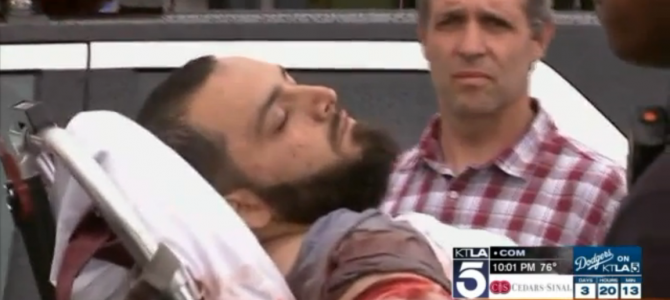“Ahmad Khan Rahami’s Father Told Police in 2014 His Son Was a Terrorist, Officials Say,” according to the New York Times.
The story says that when alleged New York and New Jersey bomber Rahami was captured, he was carrying a notebook in which he wrote of killing unbelievers. Investigators are looking into what, if any, assistance he had in carrying out his terror plot as well as his series of trips to Pakistan:
The father made the statement about his son being a terrorist to New Jersey police in 2014, when Mr. Rahami was arrested after a domestic dispute and accused of stabbing his brother.
The information was passed to the Joint Terrorism Task Force led by the Federal Bureau of Investigation in Newark. Officers opened what is known as an assessment, the most basic of F.B.I. investigations, and interviewed the father, who then recanted.
This is the latest example of the FBI receiving tips about terrorists prior to their acts of terror. Here are a few others of recent vintage:
- Orlando: The FBI was tipped off to Omar Mateen’s radical views in 2013. They put him under surveillance and used confidential informants, but dropped the investigation. A year later he was investigated for ties to the first American suicide bomber in Syria. They dropped that investigation as well. He went on to kill 49 clubgoers and injure another 53.
- The ‘Draw Muhammad’ Shooter: The FBI allegedly egged on one of the men involved in the terror attack, after previously closing a case involving making false statements to federal officials. Here’s what The Daily Beast reported: “Days before an ISIS sympathizer attacked a cartoon contest in Garland, Texas, he received a text from an undercover FBI agent. ‘Tear up Texas,’ the agent messaged Elton Simpson days before he opened fire at the Draw Muhammad event, according to an affidavit (pdf) filed in federal court Thursday.” Shortly thereafter, he and his accomplice drove to the contest and shot at police officers.
- Boston Bombers: Russians told the FBI that Tamerlan Tsarnaev was an Islamist preparing to join militants. The agency investigated him but closed the probe after three months. Two years later, he and his brother wrought terror at the Boston marathon, using pressure cooker bombs.
- Fort Hood Shooter: “The FBI was too concerned about political correctness and did not launch an investigation into a man who was later charged with killing 13 people in the 2009 attack in Fort Hood, Texas, despite significant warning signs that he was an Islamic extremist bent on killing civilians,” the Associated Press reported in 2012.
The FBI isn’t the only agency to have dropped the ball on investigating terrorism. Here are a few other examples.
- San Bernardino Terrorists: Less than a day after a terrorist attack in which 14 people were killed and another 22 injured, the head of the San Bernardino U.S. Citizenship and Immigration Services office stonewalled Homeland Security agents attempting to investigate the man accused of supplying the guns and ammo in the attack. According to an Inspector General report, Irene Martin also gave inconsistent answers when speaking with the agents. The suspect was later apprehended.
- Dallas Police Shooter: The Army failed to fully investigate charges of misconduct against Micah Johnson, who killed five police officers and injured another seven, and erroneously granted him an honorable discharge, CNN reported.
What are we actually getting for our homeland security spending? We spend more than $8 billion a year on the FBI, $41 billion on DHS, and $70 billion on intelligence. The bombs in New York City were found by random people on the street wanting free stuff, and curious neighbors. The New Jersey bombs were heroically discovered by homeless people rifling through garbage. The Minnesota ISIS terrorist was killed by an NRA-certified concealed carry instructor.
There are many wonderful federal employees toiling away in each of these agencies, and many committed bureaucrats and officers doing what they can to keep the country safe. At the same time, it’s worth asking if the administrative state’s handling of terror threats is worth the tremendous expense that goes with it. If not, it’s also worth asking what all needs to change.








